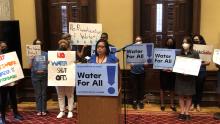
The Baltimore metropolitan area’s water governance may take on a new form. What that means for City Union of Baltimore, Local 800 (CUB) members who work diligently to service the water and wastewater infrastructure is yet to be determined. However, CUB joined forces with a coalition of advocacy groups to hold a press conference demanding greater transparency of the Baltimore Regional Water Task Force, a body that was authorized by state elected officials during the 2023 legislative session. The coalition featured environmental, racial, economic, and labor justice advocates including representatives from Food and Water Watch, NAACP Legal Defense Fund, and Maryland Volunteer Lawyer Services.
CUB president Antoinette Ryan-Johnson led the call for greater inclusion in the task force. Ryan-Johnson stressed that a wide range of residents would be affected by changes to the water infrastructure system thus demanding a variety of voices on any task force revamping the structure. She harkened to shared democratic ideals in calling on the task force to be more inclusive saying “this task force will affect a diverse group of residents, namely here in Baltimore city. In the spirit of democracy, those diverse voices… deserve to have a voice in shaping the future of water in Baltimore and across the region.”
The coalition was supported by Baltimore City councilmembers who also shared concerns over the future of Baltimore’s water resources. Councilwoman Odette Ramos wanted greater transparency for Baltimore’s water system which she described as “the third best water quality in the world.” Councilwoman Ramos aims to address transparency legislatively if necessary, saying “I will be introducing a resolution for a hearing to be able to have our city leaders come before us to understand a little bit more about how this task force process is working, who are the members, and make sure that there is a robust process for public engagement.”
The Council was also represented by Councilmember Kristerfer Burnett. Burnett cautioned the task force to be mindful of what happens when the key elements of the public are left out of decisions on public resources, saying “...establishment of a regional water authority can have a devastating impact on communities that have already experienced disinvestment, further removing the decision-making process from local officials to appointed bureaucrats… and there’s the potential for privatization that we need to continue to protect from.”
Other advocates speaking during the press conference noted their concerns about rate increases, shutoffs, and privatization of the city’s water system. Those concerns need to be addressed by the task force beyond verbal acknowledgements from local executives that those setbacks are off the table. A city council hearing on Baltimore’s place on the task force is scheduled to take place in July, and the coalition, including CUB, plans to continue their activism on the issue until all voices are included in the process.
2023-06-27
AFT-Maryland Staff
